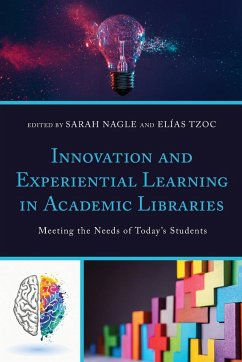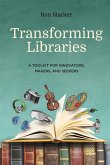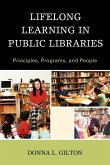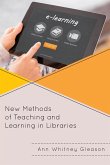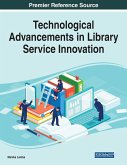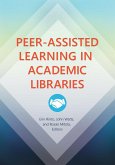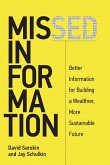Innovation and Experiential Learning in Academic Libraries
Meeting the Needs of Today's Students
Herausgeber: Nagle, Sarah; Tzoc, Elias
Innovation and Experiential Learning in Academic Libraries
Meeting the Needs of Today's Students
Herausgeber: Nagle, Sarah; Tzoc, Elias
- Broschiertes Buch
- Merkliste
- Auf die Merkliste
- Bewerten Bewerten
- Teilen
- Produkt teilen
- Produkterinnerung
- Produkterinnerung
Innovation and Experiential Learning in Academic Libraries: Meeting the Needs of 21st Century Students addresses the multitude of ways that academic librarians are collaborating with faculty and helping students develop these enduring skills by developing and integrating active and experiential learning approaches into teaching activities.
Andere Kunden interessierten sich auch für
![Transforming Libraries Transforming Libraries]() Ron StarkerTransforming Libraries23,99 €
Ron StarkerTransforming Libraries23,99 €![International Students and Academic Libraries International Students and Academic Libraries]() Diane E. PetersInternational Students and Academic Libraries117,99 €
Diane E. PetersInternational Students and Academic Libraries117,99 €![Lifelong Learning in Public Libraries Lifelong Learning in Public Libraries]() Donna L. GiltonLifelong Learning in Public Libraries90,99 €
Donna L. GiltonLifelong Learning in Public Libraries90,99 €![New Methods of Teaching and Learning in Libraries New Methods of Teaching and Learning in Libraries]() Ann Whitney GleasonNew Methods of Teaching and Learning in Libraries89,99 €
Ann Whitney GleasonNew Methods of Teaching and Learning in Libraries89,99 €![Technological Advancements in Library Service Innovation Technological Advancements in Library Service Innovation]() Technological Advancements in Library Service Innovation176,99 €
Technological Advancements in Library Service Innovation176,99 €![Peer-Assisted Learning in Academic Libraries Peer-Assisted Learning in Academic Libraries]() Peer-Assisted Learning in Academic Libraries74,99 €
Peer-Assisted Learning in Academic Libraries74,99 €![Missed Information Missed Information]() David SarokinMissed Information30,99 €
David SarokinMissed Information30,99 €-
-
-
Innovation and Experiential Learning in Academic Libraries: Meeting the Needs of 21st Century Students addresses the multitude of ways that academic librarians are collaborating with faculty and helping students develop these enduring skills by developing and integrating active and experiential learning approaches into teaching activities.
Hinweis: Dieser Artikel kann nur an eine deutsche Lieferadresse ausgeliefert werden.
Hinweis: Dieser Artikel kann nur an eine deutsche Lieferadresse ausgeliefert werden.
Produktdetails
- Produktdetails
- Verlag: Rowman & Littlefield Publishers
- Seitenzahl: 222
- Erscheinungstermin: 15. März 2022
- Englisch
- Abmessung: 229mm x 152mm x 13mm
- Gewicht: 368g
- ISBN-13: 9781538151846
- ISBN-10: 1538151847
- Artikelnr.: 62811410
- Herstellerkennzeichnung
- Libri GmbH
- Europaallee 1
- 36244 Bad Hersfeld
- gpsr@libri.de
- Verlag: Rowman & Littlefield Publishers
- Seitenzahl: 222
- Erscheinungstermin: 15. März 2022
- Englisch
- Abmessung: 229mm x 152mm x 13mm
- Gewicht: 368g
- ISBN-13: 9781538151846
- ISBN-10: 1538151847
- Artikelnr.: 62811410
- Herstellerkennzeichnung
- Libri GmbH
- Europaallee 1
- 36244 Bad Hersfeld
- gpsr@libri.de
After earning her MSLIS from the University of Illinois Urbana-Champaign in 2015, Sarah Nagle spent 3 years as a librarian at Pikes Peak Library District in Colorado where she worked to provide engaging programming for all ages and ability levels in the district's makerspaces. Sarah now serves as Creation and Innovation Services Librarian at Miami University in Ohio. After opening a Makerspace at Miami's King Library with her colleagues in 2019, Sarah supports learning in the space with one-on-one and group instruction on a variety of maker and innovation topics. She works with faculty from a wide range of disciplines to incorporate maker-centered learning into courses. Elias Tzoc is a 2007 graduate of the University of Texas at Austin, School of Information. He joined Miami University in August 2007. He is currently the Head of the Create and Innovate Department, where he leads a group of seven creative librarians and technologists working on innovative and entrepreneurial library services that support transdisciplinary research and scholarship at Miami University. His publications include articles related to innovation and digital scholarship.
Series Editor's Foreword - Trudi Jacobson
Introduction - Jerome Conley
Section 1: Innovation and Leadership
Chapter 1: Planning, Advocating and Fostering Creativity and Innovation -
Elías Tzoc
Chapter 2: Leadership for Innovation: Strategies and Considerations -
Bohyum Kim
Chapter 3: Bringing Experiential Learning to Campus: How to Develop
Partnerships and Implement Immersive Learning Experiences - Andrew See and
Chris Holthe
Section 2: Examples and Case Studies
Chapter 4: Leading by Design: Building an Experiential Studio to Support
Interdisciplinary Learning - Emily S. Darowski, Matt Armstrong, and Leanna
Fry
Chapter 5: Creative Deconstruction: Using Zines to Teach the ACRL Framework
- Stefanie Hilles
Chapter 6: LEGOTM, the Library, and a Mastodon Tusk: Undergraduate Research
Partnerships in Chemistry - Anne Marie Gruber and Dr. Joshua Sebree
Chapter 7: Out of the Archives: Making Collections Accessible through the
Implementation of a 3D Scanning Lab - Kristi Wyatt and Dr. Zenobie S.
Garrett
Chapter 8: Collaborative Implementation of a Semi-Automated 3D Printing
Service - Amy Van Epps, Matt Cook, and Susan Berstler
Chapter 9: Making Space for Non-Traditional Makers - Annalise Philips and
Jen Brown
Section 3: Future Literacy Developments
Chapter 10: Maker Literacy, Metaliteracy, and the ACRL Framework - Sarah
Nagle
Chapter 11: Off the Cutting Edge: Lessons Learned From Centering People in
Creative Technology Spaces - Kelsey Sheaffer, Oscar K. Keyes, Eric Johnson,
Jason Evans Groth, Vanessa Rodriguez, and Emily Thompson
Chapter 12: Developing an Engati-based Library Chatbot to Improve Reference
Services - Shu Wan
About the Editors and the Contributors
Introduction - Jerome Conley
Section 1: Innovation and Leadership
Chapter 1: Planning, Advocating and Fostering Creativity and Innovation -
Elías Tzoc
Chapter 2: Leadership for Innovation: Strategies and Considerations -
Bohyum Kim
Chapter 3: Bringing Experiential Learning to Campus: How to Develop
Partnerships and Implement Immersive Learning Experiences - Andrew See and
Chris Holthe
Section 2: Examples and Case Studies
Chapter 4: Leading by Design: Building an Experiential Studio to Support
Interdisciplinary Learning - Emily S. Darowski, Matt Armstrong, and Leanna
Fry
Chapter 5: Creative Deconstruction: Using Zines to Teach the ACRL Framework
- Stefanie Hilles
Chapter 6: LEGOTM, the Library, and a Mastodon Tusk: Undergraduate Research
Partnerships in Chemistry - Anne Marie Gruber and Dr. Joshua Sebree
Chapter 7: Out of the Archives: Making Collections Accessible through the
Implementation of a 3D Scanning Lab - Kristi Wyatt and Dr. Zenobie S.
Garrett
Chapter 8: Collaborative Implementation of a Semi-Automated 3D Printing
Service - Amy Van Epps, Matt Cook, and Susan Berstler
Chapter 9: Making Space for Non-Traditional Makers - Annalise Philips and
Jen Brown
Section 3: Future Literacy Developments
Chapter 10: Maker Literacy, Metaliteracy, and the ACRL Framework - Sarah
Nagle
Chapter 11: Off the Cutting Edge: Lessons Learned From Centering People in
Creative Technology Spaces - Kelsey Sheaffer, Oscar K. Keyes, Eric Johnson,
Jason Evans Groth, Vanessa Rodriguez, and Emily Thompson
Chapter 12: Developing an Engati-based Library Chatbot to Improve Reference
Services - Shu Wan
About the Editors and the Contributors
Series Editor's Foreword - Trudi Jacobson
Introduction - Jerome Conley
Section 1: Innovation and Leadership
Chapter 1: Planning, Advocating and Fostering Creativity and Innovation -
Elías Tzoc
Chapter 2: Leadership for Innovation: Strategies and Considerations -
Bohyum Kim
Chapter 3: Bringing Experiential Learning to Campus: How to Develop
Partnerships and Implement Immersive Learning Experiences - Andrew See and
Chris Holthe
Section 2: Examples and Case Studies
Chapter 4: Leading by Design: Building an Experiential Studio to Support
Interdisciplinary Learning - Emily S. Darowski, Matt Armstrong, and Leanna
Fry
Chapter 5: Creative Deconstruction: Using Zines to Teach the ACRL Framework
- Stefanie Hilles
Chapter 6: LEGOTM, the Library, and a Mastodon Tusk: Undergraduate Research
Partnerships in Chemistry - Anne Marie Gruber and Dr. Joshua Sebree
Chapter 7: Out of the Archives: Making Collections Accessible through the
Implementation of a 3D Scanning Lab - Kristi Wyatt and Dr. Zenobie S.
Garrett
Chapter 8: Collaborative Implementation of a Semi-Automated 3D Printing
Service - Amy Van Epps, Matt Cook, and Susan Berstler
Chapter 9: Making Space for Non-Traditional Makers - Annalise Philips and
Jen Brown
Section 3: Future Literacy Developments
Chapter 10: Maker Literacy, Metaliteracy, and the ACRL Framework - Sarah
Nagle
Chapter 11: Off the Cutting Edge: Lessons Learned From Centering People in
Creative Technology Spaces - Kelsey Sheaffer, Oscar K. Keyes, Eric Johnson,
Jason Evans Groth, Vanessa Rodriguez, and Emily Thompson
Chapter 12: Developing an Engati-based Library Chatbot to Improve Reference
Services - Shu Wan
About the Editors and the Contributors
Introduction - Jerome Conley
Section 1: Innovation and Leadership
Chapter 1: Planning, Advocating and Fostering Creativity and Innovation -
Elías Tzoc
Chapter 2: Leadership for Innovation: Strategies and Considerations -
Bohyum Kim
Chapter 3: Bringing Experiential Learning to Campus: How to Develop
Partnerships and Implement Immersive Learning Experiences - Andrew See and
Chris Holthe
Section 2: Examples and Case Studies
Chapter 4: Leading by Design: Building an Experiential Studio to Support
Interdisciplinary Learning - Emily S. Darowski, Matt Armstrong, and Leanna
Fry
Chapter 5: Creative Deconstruction: Using Zines to Teach the ACRL Framework
- Stefanie Hilles
Chapter 6: LEGOTM, the Library, and a Mastodon Tusk: Undergraduate Research
Partnerships in Chemistry - Anne Marie Gruber and Dr. Joshua Sebree
Chapter 7: Out of the Archives: Making Collections Accessible through the
Implementation of a 3D Scanning Lab - Kristi Wyatt and Dr. Zenobie S.
Garrett
Chapter 8: Collaborative Implementation of a Semi-Automated 3D Printing
Service - Amy Van Epps, Matt Cook, and Susan Berstler
Chapter 9: Making Space for Non-Traditional Makers - Annalise Philips and
Jen Brown
Section 3: Future Literacy Developments
Chapter 10: Maker Literacy, Metaliteracy, and the ACRL Framework - Sarah
Nagle
Chapter 11: Off the Cutting Edge: Lessons Learned From Centering People in
Creative Technology Spaces - Kelsey Sheaffer, Oscar K. Keyes, Eric Johnson,
Jason Evans Groth, Vanessa Rodriguez, and Emily Thompson
Chapter 12: Developing an Engati-based Library Chatbot to Improve Reference
Services - Shu Wan
About the Editors and the Contributors

